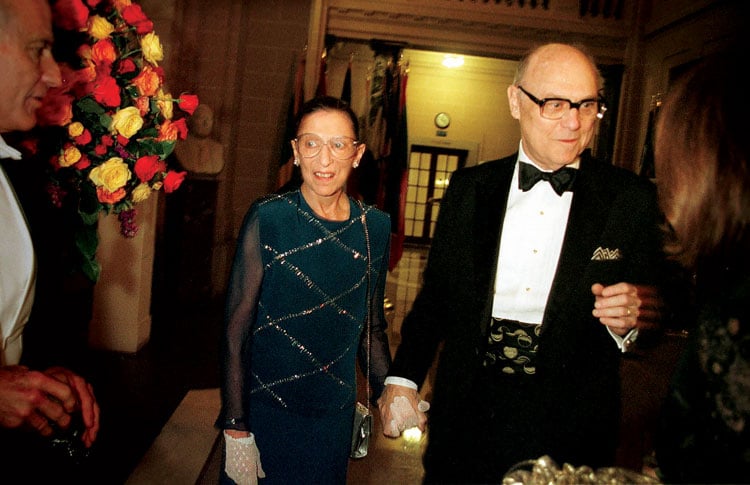Stop chasing perfection, and make it a family affair

Justice Ruth Bader Ginsburg and her husband, lawyer Marty Ginsburg, at a gala in Washington D.C. in 2000. Photo by Karin Cooper/Liaison.
Achieving work-life balance has been a hot topic for many years, especially for those in the legal profession. Clients expect ready accessibility. Court appearances cannot be missed. Filing deadlines must be strictly followed. In solo and small-firm practices, we are not only lawyers but also business owners responsible for our employees’ professional and financial well-being. A lawyer’s job can be both mentally and physically exhausting. From my experience as a parent, a spouse and a family law attorney, I have learned achieving the equilibrium of family happiness and professional advancement requires a team effort from the family—including parents, children and sometimes grandparents.

Photo of Rong T. Kohtz by Dr. D. Stave Kohtz
Both partners’ support and active engagement is vital to a satisfying work-home balance. Since her passing, Justice Ruth Bader Ginsburg has been celebrated not only as a trailblazing legal giant but also as a loving wife, mother and grandmother. Part of Justice Ginsburg’s success story was the consistent support of her husband, Marty Ginsburg. Justice Ginsburg is an example of a woman who defied stereotypes, and her spouse is an example of a man who defied stereotypes. Their love and support for each other led to celebrated legal careers and a happy family life. The Ginsburgs demonstrated that a strong partnership at home leads to success as professionals, life partners and parents. Like my grandmother used to say: “Women hold up half of the sky, men hold up the other half.”
All hands on deck
Forging a strong, supportive relationship with the other “parental unit” is not easy. It requires ongoing efforts. As a divorce lawyer, I often see family breakdowns due to the parents’ inability to cooperate and to compromise. A rigid division of family responsibilities does not work. In a family, not everything is a quid pro quo. My husband and I do not have a clear division of labor. The flexibility has worked well. When he has more work than I do, I will take more parenting and domestic responsibilities. He will do the same for me. When we both are swamped, the kids will take more responsibilities and help us to get through the tough time.
Children also play an indispensable role in family success. One big challenge in balancing parenthood and law practice is to manage the expectations surrounding parenthood. “Tiger moms” prescribe to us an upper middle-class fantasy of “intensive motherhood” that demands exorbitant amounts of time, labor and money. The headlines in the New York Times’ parenting section alone can make one’s head spin:
• “How to Teach Children About Healthy Eating, without Food Shaming”
• “How to Forge a Solid Parent-Teacher Relationship”
• “Updating the ‘You Go Girl’ Book Collection”
• “A Lot of Bad News Out There: Parenting in a Pandemic”
• “‘Just a Small Play Date’? You Still Need to Be Careful”
• “The Freedom and Fulfillment of Home-Schooling”
All this parenting advice focuses on how parents can meet the children’s needs and demands, not vice versa. The combination of unrealistic expectations from intensive parenting and the demanding legal profession can knock anyone off balance. I propose rejecting the hysteria of intensive parenting and making the children part of the team.
In our family, the kids are integrated into our professional lives. We feel that our children respect our professional identities and appreciate our efforts to provide them with a good family life, in large measure because they are active participants in our endeavor. Our kids are “office trained” to do their part in the family. They learned to recognize their parents’ workspaces and respect their parents’ individuality as professionals. They learned to be patient, resilient, independent and responsible. They learned to be kind and considerate about others while being assertive about their own needs and feelings. Most important, they learned from us a strong work ethic and skills needed to balance career and personal life, and they are getting better at it than we are.
We live in a society where the workplace and the family sphere are largely separated. Corporate workplaces demand that male workers forgo family responsibilities, and that their partners, mainly women, bear household labor without compensation. Social norms and workplace structures still encourage men to be breadwinners and women to be caretakers. To make it work in this family-unfriendly environment requires the entire family’s group efforts. Perhaps we will eventually be able to remodel the workplace and legal practice to a family-friendly model, one family at a time.
Rong Tao Kohtz is an international family lawyer based in New York City and Mount Pleasant, Michigan. She specializes in multijurisdictional matrimonial litigation and international child custody disputes. Kohtz is a fellow of the International Academy of Family Lawyers.
Write a letter to the editor, share a story tip or update, or report an error.


